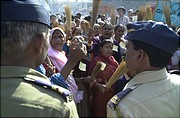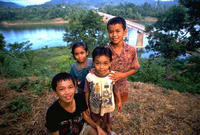 Paul Hughes has a vision: Paul Hughes has a vision:
"Imagine this. It's the year 2010, and almost everyone has a real-time always-on connection to the Net via ubiquitous wearable 'augmented reality' devices. As part of this package, made possible with advance minuturized heads-up displays, video cameras, location aware devices, GPS, swarmbots, emotion-sensitive and adaptive algorithms (i.e. Affective Computing), and sophisticated reputation systems, you are able to surf an augmented version of reality itself in real time.
Lets break this down. You would be able to, in real-time see precisely whats going on anywhere in the globe by jacking in to the collection of real-time video blogs. As part of this collection, sophisticated 3-D rendering engines would be able to take the collective video footage and extropolate a real-time VR scene, allowing you to transcend the viewing angle of any single camera. Better still, you could jack in to that part of the world from a variety of, not only physical perspectives, but political, intellectual, and emotional as well based on whatever any individual user makes public as part their unique sliding-scale trust system such as the type that Joi Ito has proposed with moblogs. All of this meta-data would form its own collective smart-mob based on individually selected criteria.
What this means is that you could then view the "scene" from virtually any angle. Imagine the possibility here. Some spontaneous news event occurs, and almost instantly as hundreds of people appear on the scene with wearable video cameras broadcasting on the net, you would be able to view this real-time scene from any angle, while simultaneously gaining the collective emotional assesment of the situation from those people choosing to broadcast their emotional indices, as well as the blogging that will invariable start occuring at rapid pace from your customized reputation/trust criteria.
All of this combines to gives you a real-time augmented, yet customized view of real-time reality. One that is rich in social and emotional context, providing and extending intimacy by empowering you to feel and touch the whole world." Yes, it's cool, I want it badly. It is nice to sit and write with people all over the world, but really I want to BE in those places. Hang out, look around, soak up the atmosphere. And I'm tired of people instantly lining up and putting on fake smiles when I pull out a camera. I want the real stuff, so I'd much rather have an always-on camera in my glasses.
[ Technology | 2003-01-02 03:56 | | PermaLink ] More >
|
 Paul Hughes has a vision:
Paul Hughes has a vision:
 According to Greenpeace News, Dow Chemical, the worlds largest chemical company, and new owners of Union Carbide, is suing survivors of the 1984 Union Carbide gas disaster in Bhopal, India, which killed thousands of people. On December 2nd a peaceful march of 200 women survivors from Bhopal delivered toxic waste from the abandoned Carbide factory back to Dow's Indian headquarters in Bombay with the demand that Dow take responsibility for the disaster and clean up the site. Instead, Dow files a lawsuit against them for $10,000 for "loss of work". One Dow employee briefly came outside to meet the protesters. Apparently he's very well paid. On the other hand, that amounts to about 10 years of income for those particular protesters. Dow's new CEO, William Stravopoulos, is the person who engineered the Dow merger with Union Carbide in 2001.
According to Greenpeace News, Dow Chemical, the worlds largest chemical company, and new owners of Union Carbide, is suing survivors of the 1984 Union Carbide gas disaster in Bhopal, India, which killed thousands of people. On December 2nd a peaceful march of 200 women survivors from Bhopal delivered toxic waste from the abandoned Carbide factory back to Dow's Indian headquarters in Bombay with the demand that Dow take responsibility for the disaster and clean up the site. Instead, Dow files a lawsuit against them for $10,000 for "loss of work". One Dow employee briefly came outside to meet the protesters. Apparently he's very well paid. On the other hand, that amounts to about 10 years of income for those particular protesters. Dow's new CEO, William Stravopoulos, is the person who engineered the Dow merger with Union Carbide in 2001. The Jhai Foundation is working on providing Internet access for remote villages in Laos. They've put together a system where sturdy low-wattage computers can be powered by a foot-crank, and a system in each village can be linked with the others, and with the net, through high-bandwidth wireless networking.
The Jhai Foundation is working on providing Internet access for remote villages in Laos. They've put together a system where sturdy low-wattage computers can be powered by a foot-crank, and a system in each village can be linked with the others, and with the net, through high-bandwidth wireless networking.